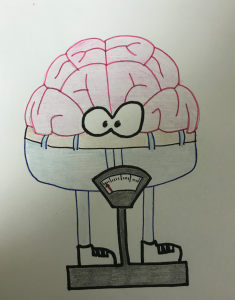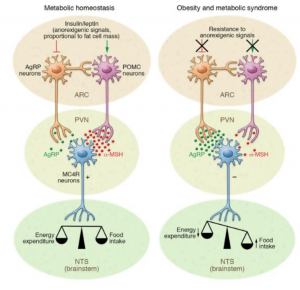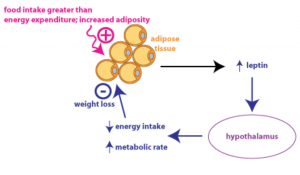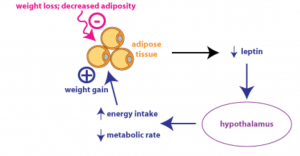 Obesity is becoming more and more prevalent, as rates climb throughout both adult and youth populations. Around 40% of adults (over 20 years of age) are obese, as well as 20% of children. In the last 15 years alone these rates have shown a great increase. Obesity leads to the development of many serious health issues such as type 2 diabetes, hypertension, steatohepatitis, heart disease, stroke, cancer, depression, sleep apnea… the list goes on and on. To many people who are not obese, it seems as if there should be an easy fix to the obesity epidemic sweeping the nation: eat healthy and exercise. But what if I told you it is not as simple as that? What if I said that obesity can actually be classified as a neurological disorder? Because sometimes, there isn’t a simple answer to losing weight and keeping it off.
Obesity is becoming more and more prevalent, as rates climb throughout both adult and youth populations. Around 40% of adults (over 20 years of age) are obese, as well as 20% of children. In the last 15 years alone these rates have shown a great increase. Obesity leads to the development of many serious health issues such as type 2 diabetes, hypertension, steatohepatitis, heart disease, stroke, cancer, depression, sleep apnea… the list goes on and on. To many people who are not obese, it seems as if there should be an easy fix to the obesity epidemic sweeping the nation: eat healthy and exercise. But what if I told you it is not as simple as that? What if I said that obesity can actually be classified as a neurological disorder? Because sometimes, there isn’t a simple answer to losing weight and keeping it off.
The high fat diets that lead to obesity change your brain. They alter the effects of leptin and insulin on certain neurons in the brain. In the brain, AgRP neurons and POMC neurons control the balance of energy expenditure and food intake. Insulin and leptin inhibit the AgRP neurons and activate the POMC neurons, which increases the release of the neurotransmitter a-MSH. These neurotransmitters activate the MC4R neuron, controlling satiety and energy expenditure. So, if your leptin and insulin activity is changed due to obesity and metabolic syndrome, AgRP is being activated and POMC is being inhibited, upsetting the balance and thus causing an increase in food intake and a decrease in energy expenditure.

So yes, the brain is altered, making it very difficult for an individual to control their desire to eat.
Weight cycling also plays a role in the difficulty of losing weight. Say an individual loses a large amount of weight. Due to weight cycling, they are more predisposed to gain the weight back. This is because the repeated loss and gain of weight promote fat deposition in adipose tissue. Fat increases leptin concentrations, causing the hypothalamus to signal to decrease food intake and increase your metabolic rate with the hope of weight loss. But then, as you lose fat, leptin levels decrease, causing the hypothalamus to signal to increase food intake and decrease the metabolic rate, causing weight gain. It is a tough cycle to try to and break.


The obesity epidemic is tough to solve because once obesity has altered an individual’s brain, it is very difficult to try and correct the problems. Of course, having a healthy lifestyle decreases the occurrences of these neurological changes. So, take care of yourself in order to keep your brain healthy, because a healthy brain is a healthy body.